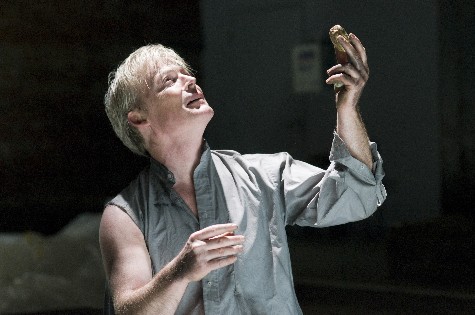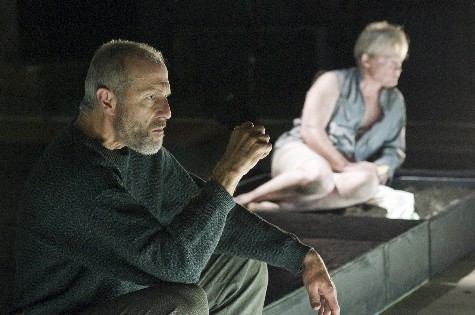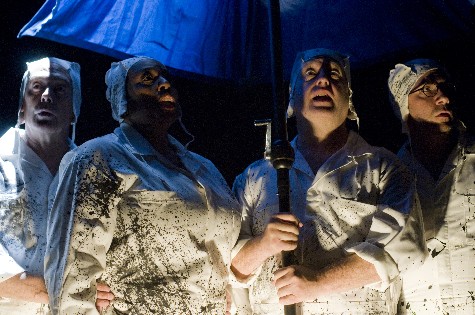Theater Review: A Timely ‘Timon of Athens’
This Shakespearean drama is savage and sour, its astringent vision of anger as the sole motive for living anticipating the death’s head satire of Swift, Céline, Thomas Bernhard, and Samuel Beckett.

Timon (Allyn Burrows) contemplates the evils of gold in the Actors' Shakespeare Project production of Timon of Athens. Photo: Stratton McCrady
Timon of Athens, by William Shakespeare. Directed by Bill Barclay. Presented by Actors’ Shakespeare Project at the Midway Studio, Boston, MA, through June 13, 2010.
Reviewed By Bill Marx
William Shakespeare’s morose vision of acquisitiveness as a terminal disease comes as a hearty breath of diagnostic air during our current Great Recession, especially in the Actors’ Shakespeare Project’s (ASP’s) invigorating production, which lends the play’s misanthropy plenty of black comic zip and zap. At its best, the show’s curdled clowning is melded to a homicidal craziness that taps into the fury at the heart of the Bard’s bitterest play.
Because of the script’s reputation as a depressing bore, this will most likely will be the only chance you will ever have to see a production of Timon of Athens—albeit rearranged, cut, and rejiggered (generally effectively) by ASP director Bill Barclay. Only the most lily-livered fans of Grade A Bard will pass up this indelible glimpse of flawed genius.
The script’s fabled bleakness counts as only one of the reasons for the unwarranted neglect. (I have only seen one other professional production: a terrific 1993 version starring Brian Bedford with incidental music by Duke Ellington at Canada’s Stratford Shakespeare Festival. The ASP’s Timon bills itself as a “Boston premiere.”)
Other reasons theater troupes have dissed the script through the centuries: charges that the play is an uncompleted draft (perhaps co-written by Thomas Middleton); belief that Shakespeare wrote it after he had a mental breakdown completing King Lear; the lack of any love interest; a distinctly unlikable protagonist who only becomes worse; critical confusion over whether the play is a tragedy or a comedy; and a second half that is mainly made up of nihilistic rants, including a competition between Timon and uber-cynic Apemantus over who has earned the right to wish mankind’s destruction the most. No kisses, no inspiring lyrics, no catharsis, no bucolic breezes—not the Swan but the Lemming of Avon.
The ASP’s production, frowzy, funny, and disquieting, blows these tasteful objections away. Timon comes off as a fractured fairy tale that viciously lampoons the (oh-so-very American) creed of perpetual conspicuous consumption, the dehumanizing worship of the great God/Devil credit. (Karl Marx quotes often from Timon in Das Kapital, his favorite line that money is “the common whore of mankind.”)
“None/ can truly say he gives, if he receives” claims the deluded Timon early on, an esteemed military man who is generous to a psychotic fault, giving freely to two-faced politicians, artists, and lords. What Timon doesn’t see is that the giver receives nothing once he has nothing else to give—when his funds run out, Timon finds that none of his friends will help him pay his considerable debts.
Once again, Shakespeare dramatizes that innocence cannot serve as its own defense. The party’s over—there are two feasts in the first act, one gloriously gauche, the other sardonically stinting—with each fat-cat parasite coming up with a different self-serving reason to stiff their former benefactor.

Timon (Allyn Burrows) and Apemantus (Will Lyman) in mid rant-off: Who deserves to hate mankind more? Photo: Stratton McCrady
The resonance with today’s international banking/Wall Street/rating agencies/free market debacle is obvious: Timon and Co would have been big in inexplicable derivatives and complex mortgages had they been around during Shakespeare’s day. The play moves into more abstract yet funkier ground once Timon, his faith crushed, heads out to the forest where he lives as a hermit, battening down on roots and fantasies of destruction. He wants to avenge himself on the corrupt populace and its rulers, and he gets his chance when he stumbles on a bag of gold, which brings out his sincere friends, such as the exiled Captain Alcibiades, who wants to crush Athens in revenge for the death of one of his soldiers, and various parasites who figure that the gullible Timon should be separated from his lucky loot. Of course, Timon hands the gelt over to all, including prostitutes and muggers, with high spirits—all the better to speed mankind’s greedy self-destruction.
I think Barclay’s instinct to play up Timon as a zany but dark comedy is a good one, partly because the approach fits into something I have always thought about the play but that has not (surprisingly) been remarked on by critics. Shakespeare obviously had another great playwright who explored the deforming, dehumanizing energies of desire in mind: Ben Jonson. For example, in The Alchemist (written around the same time as Timon) Epicure Mammon dreams of owning everything in the world—he is at the top of a food chain of thieves and con men who will swindle friend and foe for the sake of gold and fortune. Fellow feeling, kindness, morality, these and other human qualities only serve as manipulative masks for rapacity.
Timon is the playful photo-negative of Jonson’s possessive monsters—he is generosity incarnate until he learns that there will be no reciprocity, which turns him into another extreme of want, a misanthrope. Shakespeare may be pushing Jonson to his amoral outer limits here—the latter is at his weakest evoking the values that control or curtail his characters’ ferocious, imaginative appetites. Timon ventures into the ethical (or humane) vacuum at the center of Jonson’s satiric vision and isn’t quite sure where to go once it reaches the twilight zone. That makes Timon problematic as drama but powerful as an examination of the high price of excess.
Certainly the peculiar, brusque lyricism in Timon draws on Jonson’s strategy of making dreams of possession poetic, inflaming the imagination of his characters with ever more elaborate desires, ever-mounting metaphoric homages to living on easy street. Shakespeare applies this element of fantasia to the idea of thievery, as in his wonderful speech by Timon, which takes stealing to its cosmic end point:
The sun’s a thief, and with his great attraction
Robs the vast sea; the moon’s an arrant thief,
And her pale fire she snatches from the sun;
The sea’s a thief, whose liquid surge resolves
The moon into salt tears; the earth’s a thief,
That feeds and breeds by a composture stol’n
From gen’ral excrement; each thing’s a thief.
Timon‘s language may fly high, but throughout the play it returns again and again to “excrement,” “poison,” and other images of pestilence and decay. The poetry doesn’t show us characters thinking or dramatize emotional states so much as build up violent images of disillusionment and topple them—returning them to the contaminated earth (with its harvest of gold) much as the disguised Timon digs for his supper in the ground. The drama is monochromatic, essentially static in the second act, but its vision of anger as the sole motive for living, anticipates the death’s head satire of Swift, Céline, Thomas Bernhard, and Samuel Beckett.
As the quartet of Athenian madcaps that leave Timon in the lurch, Steven Barkhimer, John Kuntz, Joel Colodner, and Michelle Dowd are amusing financial degenerates, coming up with an inventive compendium of comic tics and vocal heehaws. My major reservation is that the slapstick proceedings sometimes grow repetitious and strained. (Jonson tucks his zanies into an ingenious plot — but nothing happens in Timon aside from cursing.) We need to glimpse the scary wolf’s fangs under the clown’s grins; after all, the play is about the survival of the Athenian fittest, which turns out to be those who are the most agilely selfish.
Will Lyman plays the scoffer Apemantus, delivering the character’s zingers with stentorian panache in an impish performance that at times becomes much more—the actor’s anguished deadpan suggests that this prophet, though right about the greed around him, knows that he is a ridiculous downer, the impotent kibitzer at the party. Bobbie Steinbach is winningly toughly-tender as Flavius, Timon’s loyal servant though thick, thin, and psychosis.
But the ASP production is anchored in Allyn Burrows’ strong performance, especially when his maddened Timon heads for the hills, the excoriating lord of a patch of rubble. At his best, the actor manages to be both mischievous and potentially murderous at the same time. Burrows reminds me of a demented Bugs Bunny—the actor even chomps on a turnip like Bugs, chewing away, giggling with glee, as he thinks about a new way to off mankind. Yet Burrows jumps from that cartoon posture, with dazzling speed, into a figure of genuine menace, a demon of impotent destruction.

The Clowns of Timon wonder about the weather. Photo: Stratton McCrady
There’s a marvelous moment when Timon hands a stone to one of his former friends, to whom he has just given a chunk of gold. Burrows insinuates, with a touch of comic flair that slowly metamorphoses into cool murderous rage, that there is a way to alchemize that lead into gold—by knocking the brains out of someone else. (Perhaps the conceit’s dovetailing of making a profit and a killing is a pun on Jonson’s play?) An admirable performance given that Timon is more of an idea than a character—a sketch to which Burrows adds unpredictably zesty flesh and blood.
Director Barclay has many dramatically effective ideas, such as having the backdrop, a laugh-out-loud bad (but expensive) abstract painting of Timon, collapse to the ground once he loses his dough. On the debit side, his movement of the actors about the stage is often stodgy, lacking dynamism to the point of becoming downright counterproductive. For example, sticking the Athenian senators and Alcibiades on tall ladders only makes the play’s final scene more toothless than it already is. For some reason, the Captain has decided to rethink his plan to conquer Athens. Along the way he has picked up a bit of mercy—in a play that doesn’t offer a sliver of the stuff.
Yet I will forgive Barclay for that misstep and others because of his striking dramatization of Timon’s death—a modest but powerful picture of self-erasure, inhumation via weariness. The ASP’s production of Timon of Athens proves that this supposedly “minor” Shakespeare play has received a premature theatrical burial.
Tagged: Actors' Shakespeare Project, Allyn Burrows, Bill Barclay, Timon of Athens

Welcome as the ASP’s production of “Timon” is, it is not, as claimed, a “Boston premiere.” Harvard and Radcliffe students mounted the work in Agassiz Theater in November of 2000. And I suspect there must have been earlier local stagings during the previous generations.
Intriguing as this sounds (and I love Allyn Burrows), how is the sound quality? I have been to other ASP productions and have been unable to hear the lines. Is there any amplification?